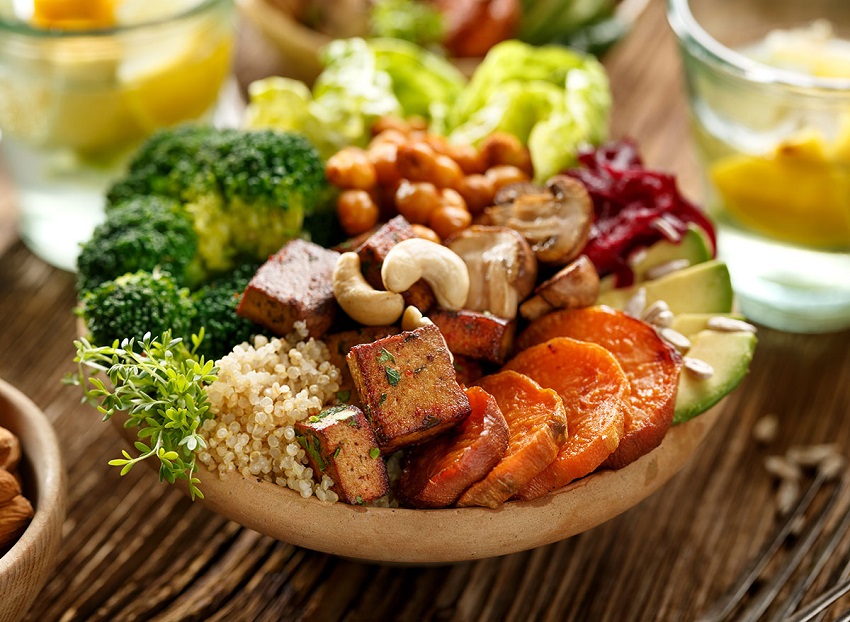
17 Aug Are Vegan Diets Healthy? Debunking Myths and Unveiling Benefits
In recent years, the popularity of vegan diets has surged as more individuals seek healthier and more sustainable dietary choices. The concept of abstaining from all animal products, including meat, dairy, eggs, and even honey, might raise questions about the nutritional adequacy and healthfulness of such a lifestyle. Are vegan diets truly healthy, or are they just another dietary trend? In this article, we’ll delve into the topic of vegan diets, exploring their impact on health, potential benefits, and addressing common concerns. This content is brought to you by Calvitaminsuit.com.
Understanding the Basics: What Does a Vegan Diet Entail?
A healthy vegan diet is a plant-based dietary approach that eliminates all animal-derived foods. Instead, it emphasizes fruits, vegetables, grains, legumes, nuts, seeds, and plant-based alternatives. The absence of animal products might lead to concerns about essential nutrients like protein, iron, calcium, and vitamin B12.
The Nutritional Myth: Can You Get Enough Protein?
One of the most common misconceptions about vegan diets is the assumption that they lack sufficient protein. However, plant-based sources like lentils, chickpeas, quinoa, tofu, and seitan are excellent protein providers. Balancing different protein sources can easily meet daily protein requirements.
Embracing Wholesome Carbohydrates: Debunking the Keto Comparisons
Vegan diets often include a higher proportion of carbohydrates, which has led to comparisons with low-carb diets like keto. However, it’s crucial to differentiate between complex carbohydrates from whole grains, fruits, and vegetables, and simple refined carbohydrates. Complex carbs offer sustained energy without the health risks associated with excessive simple carb consumption.
Vital Nutrients: Addressing Iron, Calcium, and Vitamin B12 Concerns
Critics of vegan diets often raise concerns about the adequacy of nutrients like iron, calcium, and vitamin B12. While it’s true that plant-based sources of iron (non-heme iron) are less readily absorbed, coupling them with vitamin C-rich foods can enhance absorption. Similarly, calcium sources like fortified plant milk and leafy greens can fulfill calcium needs, and vitamin B12 supplements are essential due to its absence in plant foods.
Thriving on Good Fats: The Role of Essential Fatty Acids
Healthy fats play a crucial role in overall well-being. Vegans can obtain essential fatty acids like omega-3 and omega-6 from flaxseeds, chia seeds, walnuts, and hemp seeds. These fats support heart health, brain function, and reduce inflammation.
Plant-Based Benefits: Exploring the Positive Impact on Health
Numerous studies have shown that adopting a vegan diet can have several health benefits. These include a lower risk of heart disease, type 2 diabetes, certain cancers, and obesity. The abundance of antioxidants, fiber, and plant compounds in vegan foods contributes to these protective effects.
Eco-Friendly and Ethical: The Environmental and Animal Welfare Aspect
Veganism goes beyond personal health; it also addresses environmental concerns and animal welfare. Animal agriculture is a leading contributor to greenhouse gas emissions, deforestation, and water pollution. Choosing a vegan lifestyle can significantly reduce one’s carbon footprint and contribute to a more sustainable planet.
Navigating Challenges: Social Situations and Nutritional Planning
While veganism offers numerous advantages, it’s important to acknowledge the challenges it can pose. Social situations, limited restaurant options, and potential nutrient gaps require careful planning. Consulting with a registered dietitian can help create a well-balanced vegan meal plan that meets individual nutritional needs.
The Power of Choice: Making Informed Decisions
In conclusion, the question “Are vegan diets healthy?” can be answered with a resounding “yes,” provided that individuals make informed dietary choices. A well-balanced vegan diet can offer a wealth of nutrients, promote overall health, and contribute to a more sustainable planet.
FAQs
Q1: Is it possible to build muscle on a vegan diet?
Absolutely. Adequate protein intake, combined with consistent strength training, can lead to muscle growth on a vegan diet.
Q2: Are there any potential downsides to veganism?
If not well-planned, vegan diets can lead to nutrient deficiencies. However, with proper planning, these risks can be mitigated.
Q3: Can children thrive on a vegan diet?
Yes, but it requires careful planning to ensure they receive all essential nutrients for growth and development.
Q4: Are there any famous athletes who follow a vegan diet?
Yes, athletes like Serena Williams, Lewis Hamilton, and Novak Djokovic have adopted vegan diets to support their performance and recovery.
Q5: How can I ensure I’m getting enough vitamin B12 on a vegan diet?
Vitamin B12 supplements or fortified foods are recommended to prevent deficiency in a vegan diet.
In embracing a vegan diet, individuals not only prioritize their health but also contribute to a more compassionate world and a greener future. It’s a lifestyle choice that carries positive impacts beyond the confines of one’s plate.


No Comments